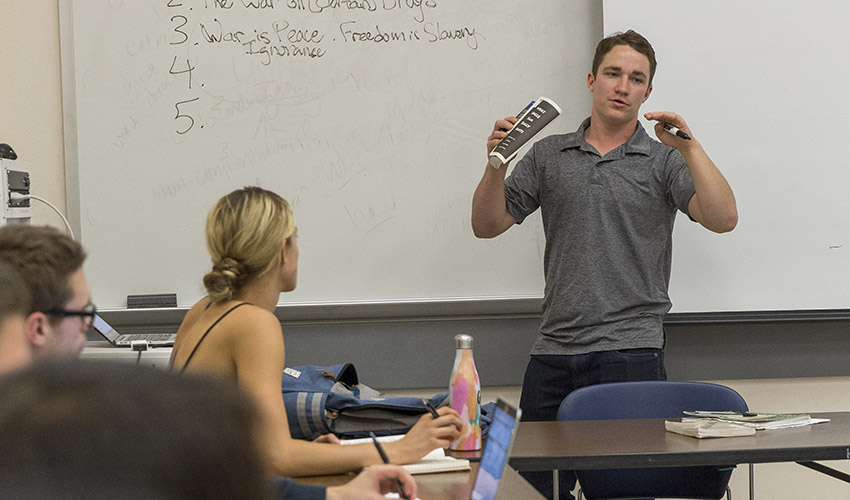Students spearhead revival of 1960s Experimental College

SF State student Benjamin Feldman leads an Experimental College class every Monday on the works of linguist, philosopher and political activist Noam Chomsky.
Product of 1960s enjoys second act following renewed student interest
San Francisco State University student Benjamin Feldman complained to Political Science Lecturer Kathy Emery that he wasn’t learning about linguist and political activist Noam Chomsky in any of his political science classes. Her response: “Why don’t you teach a class on Chomsky?”
And so he did. On Mondays, his class — “Limiting Democracy, a study of Noam Chomsky” — meets inside the Humanities Building. More than 20 students gather, their desks arranged in a circle, to discuss the class materials: writings and a film by Chomsky. The class is part of the revival of the Experimental College, a student-led college that uses a progressive, student-centered teaching approach.
The pilot program launched this fall and students can choose from four, one-unit courses on topics ranging from cybersecurity to Syrian refugees. Student teachers choose the subject, design the curriculum, recruit students and can earn up to four units for their efforts.
What’s appealing to students about the Experimental College is that they control the pace of the class as well as the subject matter, so they’re learning material that’s relevant to their lives, said Emery, one of the program’s advisers. “Progressive teachers figure out where students are intellectually and what they’re interested in learning. They’ll engage those interests and passions and let the students lead the class through their questions and discussions,” she said. This differs from the conventional lecture style used in most college classrooms. A lot of research shows that students walk away from lectures retaining maybe 10 percent of what was taught, she added.
Alisar Mustafa teaches “Syrian Refugees: Analysis of Global Issues.” She’s from Syria and left in 2011 with her family after her father sought political asylum in Austria. Since then, she’s dedicated herself to helping other Syrian refugees, mostly through fund raisers. But her preferred method of aid is education. She wants to be a professor and teach people about the conflict in Syria. So far, her experience this semester has been powerful, and it’s solidified her knowledge of the topic. “When you put your confidence in students and tell them, ‘You can run this class,’ they become passionate, confident and capable,” she said.
If the Experimental College sounds like a product of the 1960s that’s because the original started in 1965 as an outgrowth of various counterculture and activist movements at SF State and colleges throughout the U.S.. Courses offered at what was then San Francisco State College weren’t addressing the issues students were facing in their communities, and they wanted classes that were germane to their lives. “A group of progressive students, many with experience organizing in the Civil Rights Movement and were inspired by Berkeley's Free Speech Movement, took over the student government in the spring of 1964 and launched the Experimental College in the fall of 1965. They took the name from University of Wisconsin's Experimental College in the 1920s and 30s. The courses offered from 1965-1968 reflected the concerns of these progressive students, which included black, La Raza and Asian studies,” Emery said. This curriculum became the foundation for one of the demands made by the student strikers in 1968 resulting in the creation of the College of Ethnic Studies, the first and only college of its kind in the U.S.
Students in Emery’s class “The Politics of Pedagogy” study archives from the original Experimental College. And that’s where student interest in resurrecting the program grew. She got in touch with Professor Trevor Getz, chair of the Department of History, and Associate Professor of Sociology Chris Bettinger to develop a pilot proposal to restart the program. The Division of Undergraduate Education and Academic Planning reviewed it and approved the pilot.
So far, all of the student teachers have come out of one of Emery’s classes, which emphasize student teaching and social justice. It’s a natural training ground for students interested in leading an Experimental College course. In the future, other departments will develop similar feeder classes, according to the proposal. Already, interest in the program has spread, and Emery has received two proposals for next semester’s courses, which are due by Dec. 1.